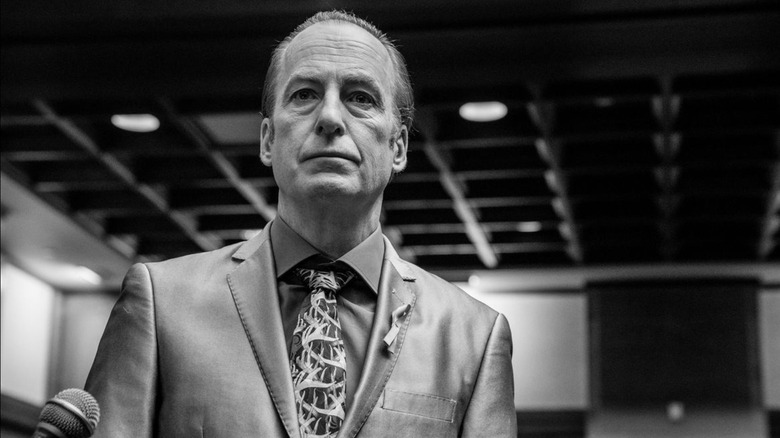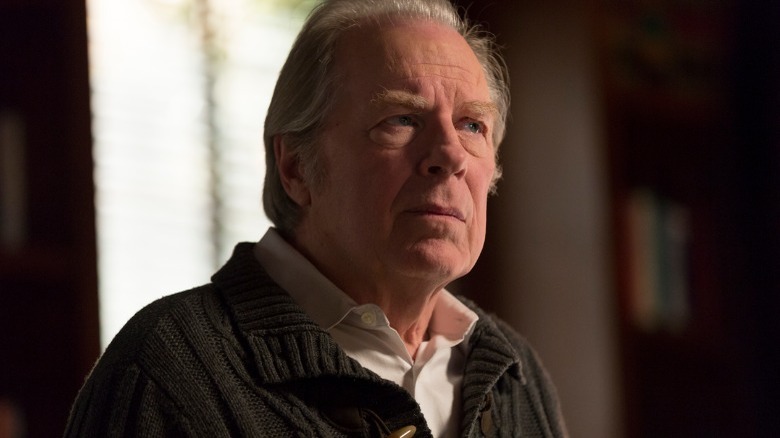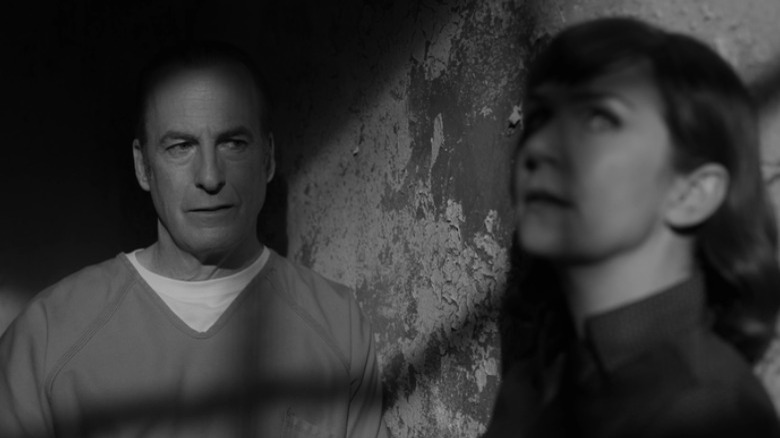The Better Call Saul Finale Was Inspired By A Holiday Classic
For seven years, "Better Call Saul" fans have watched with rapt attention as lawyer and con man Jimmy McGill (Bob Odenkirk) transformed into sleazy crime lord Saul Goodman. The change was more gradual than expected, and more emotional, too. By the time the series finally fast-forwarded through the years between Jimmy's breakup with Kim (Rhea Seehorn) and his first encounter with Walter White, we weren't so much thrilled to see the character's reverse evolution take place as we were devastated.
This is why the show's beautiful, subtle, thrilling series finale came as such a surprise. For a while, writer-director Peter Gould let viewers think that Jimmy was gone for good, replaced by the kind of heartless coward who would try to convince a grieving widow he was innocent, only to callously yank the rug out from under her in public for his own gain. Hell, Jimmy was the person who did that, reeling in Marie Schrader (Betsy Brandt) in a sickening stunt to get a reduced sentence. But once he heard that Kim had turned herself in only moments after getting his deal, Jimmy seemed to remember himself again for the first time in years.
As with many of the show's best tricks, audiences weren't in on this transformation until much later, when he spoke plaintively under oath about his misdeeds, reclaiming his name and apologizing to Kim in the process.
Three ghosts
According to Gould, who co-created the series with Vince Gilligan and helmed "Saul Gone," that climactic moment of confession was inspired in part by a classic story. "We used to talk about the progression of Jimmy McGill, of Saul Goodman as being a little like 'A Christmas Carol,'" Gould told AMC Talk.
In Charles Dickens' classic story, heartless miser Ebenezer Scrooge is visited by three ghosts, each of which helps him better understand the error of the way he's been living. By the end of his long, dark night of the soul, he emerges a changed man, and his ability to gain new insight and compassion after decades of misdeeds is seen as a Christmas miracle.
It's a story that's so familiar that watching an on-screen or stage adaptation can often feel more like a comforting holiday ritual than a genuinely heartfelt experience. But with years of commitment to its story, "Better Call Saul" breaks down the raw emotional power of Dickens' structure of atonement and contemplation, recontextualizing it for modern viewers in a way that hits us square in the heart.
A changed man
"Seeing him with Mike and with Walt and then with Chuck, it's an interesting structure," Gould explains. "In A Christmas Carol, Scrooge gets visited by three ghosts who change his perspective on life. And so in a weird way, maybe there's an echo of that in this episode where there are these three ghosts of three dead men who all made a huge impact on Jimmy's life in one way or another." In the episode, Jimmy asks two of the men what they would do if they could time travel, giving his own answers that ring false.
The third, his brother Chuck, gives him the words of wisdom that carry him through to his moment on the stand years later: "There's no shame in going back and changing your path." It echoes the spirit of a wordier line from Dickens' famous tale: "Men's courses will foreshadow certain ends, to which, if persevered in, they must lead. But if the courses are departed from, the ends will change."
Like Scrooge, Jimmy did change his path, albeit later and more poignantly than any of us could have imagined. "That's the moment where he becomes Jimmy McGill again," Gould tells AMC Talk about Jimmy's confession on the stand. "That's the last moment of Saul Goodman. When he walks into that courtroom, he walks in as Saul Goodman and he walks out as Jimmy McGill."
The final episode of the series was already a masterpiece, but in the context of this indelible Dickens story, its ability to turn a cartoonish villain's origin into an apologetic man's redemption arc is all the more profound. It's also proof that "Better Call Saul" is something we never expected it to be: a new Christmas classic.


